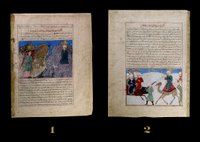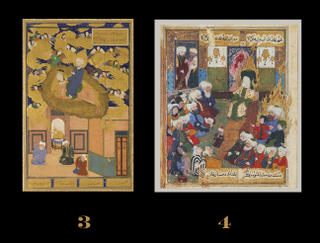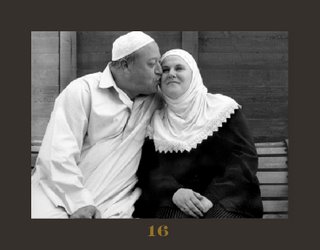
Building on the article by the Boroumand sisters, which I discussed in a previous blog, I would like to address a critical question, “In the context of our War on Terror, is Islam the enemy?”
First, I should reveal my own biases. I am not a Christian, a Buddhist, a Muslim or an adherent of any standard religion. I am not a Republican, a Democrat, a Libertarian, a liberal or a conservative. Fundamentally, I am a secular freedomist. My approach is like that of a hypothetical anthropologist from Mars who is trying to evaluate earthly matters without favoritism, a man from Mars who believes, based on empirical evidence, that the solution to many of humanity’s problems is democratic freedom.
By “enemy,” then, I mean anyone who is in violent opposition to such democratic freedom. So the question becomes, Is Islam the enemy of democratic freedom?...
"...In conclusion, the traditionalists are not our enemies, as they mainly want to be left alone to worship and live as they choose. The ruling dictators are not our enemies, since the West provides critical support against the Islamofascists who would overthrow them. And, it is not the modernists who are our enemies, as they generally support Western democratic ideals. The true enemies of democratic freedom are the Islamofascists, whose ideological homeland is Iran.
The policies that flow from this analysis are clear:...".
In part III of this series, I dealt with the voices of moderate Muslims, primarily from the west and what I see, albeit cautiously, as a movement that will beat back the influence of the Islamofascists who have high-jacked the Muslim faith. In closing I had asked:
“…what about those parts of the world where the majority of Muslims live? The great masses of people there are still poorly educated and subjected to the indoctrination of state controlled media and to the iron grip of the very Islamist version of fascism about which I write. Is there hope that Islamofacism can be defeated there? Does a handful of moderate, obviously well educated, West-friendly bloggers mean anything in the grand scheme of things?”
In this, the last of the series, I attempt to answer those questions...
October 25, 2005
Search, Arts for Democracy
 The Metropolitan Museum of Art
The Metropolitan Museum of Art1000 Fifth Avenue. New York, New York 10028.
- All rights reserved.-
Texts and Images unaltered, as required.
Birth of Islam
 Born in Mecca, in western Arabia, Muhammad (ca. 570–632), last in the line of Judeo-Christian prophets, received his first revelation in 610. Muslims believe that the word of
Born in Mecca, in western Arabia, Muhammad (ca. 570–632), last in the line of Judeo-Christian prophets, received his first revelation in 610. Muslims believe that the word ofGod was revealed to him by the archangel Gabriel in Arabic, who said, "Recite in the name of thy Lord …" (Sura 96). These revelations were subsequently collected and codified as the Qur’an (literally "recitation" in Arabic), the Muslim holy book. As the source of Muslim faith and practice, the Qur’an describes the relationship between an almighty and all-knowing God and his creations. The Qur’an also maintains that all individuals are responsible for their actions, for which they will be judged by God, and so it provides guidelines for proper behavior within the framework of a just and equitable society.
 At this time, Mecca was a prosperous city whose wealth and influence were based on the caravan trade and on the Kacba, a shrine and a place of pilgrimage housing the pagan deities then being worshipped by the Arabs. Muhammad's message, heralding a new socio-religious order based on allegiance to one god—Allah—was unpopular among the leaders of Mecca, and they forced Muhammad and his followers to emigrate north to the oasis town Yathrib (Medina). This occurred in 622, the year of the hijra, or "emigration," which marks the beginning of the Muslim calendar. In Medina, Muhammad continued to attract followers and, within a few years, Mecca had also largely embraced Islam. Upon his return to Mecca, one of the Prophet's first acts was to cleanse the Kacba of its idols and rededicate the shrine to Allah...
At this time, Mecca was a prosperous city whose wealth and influence were based on the caravan trade and on the Kacba, a shrine and a place of pilgrimage housing the pagan deities then being worshipped by the Arabs. Muhammad's message, heralding a new socio-religious order based on allegiance to one god—Allah—was unpopular among the leaders of Mecca, and they forced Muhammad and his followers to emigrate north to the oasis town Yathrib (Medina). This occurred in 622, the year of the hijra, or "emigration," which marks the beginning of the Muslim calendar. In Medina, Muhammad continued to attract followers and, within a few years, Mecca had also largely embraced Islam. Upon his return to Mecca, one of the Prophet's first acts was to cleanse the Kacba of its idols and rededicate the shrine to Allah...Diane

5 comments:
You really have compiled alot of information here in this one post entry! Wow!
Thanks for taking the time and sharing it!
Thank you for your kind feedback Liquid Life Hacker.
Power Kills by R.J. Rummel is certainly is big favorite.
I fixed a couple of defective links, sorry about that.
There is no coherent ideology of moderate Islam, consequently there can be no such persons as moderate Muslims.
The people we westerners may hopefully identify as moderate Muslims (not a term they tend to use themselves) are regarded by their fellow believers as apostates, secularists, heretics or jihadist-sleepers practising taqiyya.
The apparently well-integrated peaceful Muslim may not even know himself that he's a jihadist-sleeper until he awakes and becomes randomly violent with the onset of SJS.
Mustafa kamel, your name is great and allow this modest poster to give it an infidel French twist, Chameau A Moustache.
It is easy for us to denounce loud and clear fascism, question our religion and leaders because we are free, and it is even perceived as a civil responsibility, but Muslims in Arab nations don't enjoy that freedom without any grave cost.
Rumors are often taken seriously and when the authorities have a name, one can get in big trouble for their ideas or not, just imagine...
Here, we can disagree with the Church's cochoneries (trash) and still feel we are Christians or not.
It is the same with our Muslim friends who live in the ME. Their roots are as important to them than ours to us but many hate jihadists and those who oppress them and their loved ones. I don't like the term moderate much but these people can be considered moderate.
I would prefer MRI, Muslims rejecting islamofascim.
Leap, true! Qu'ran, not cool. I can't bring myself to like anything in there. It is an ugly little booklet.
Hope you like the twin shoveling the pigs where they belong.
I sure do Diane.
Post a Comment